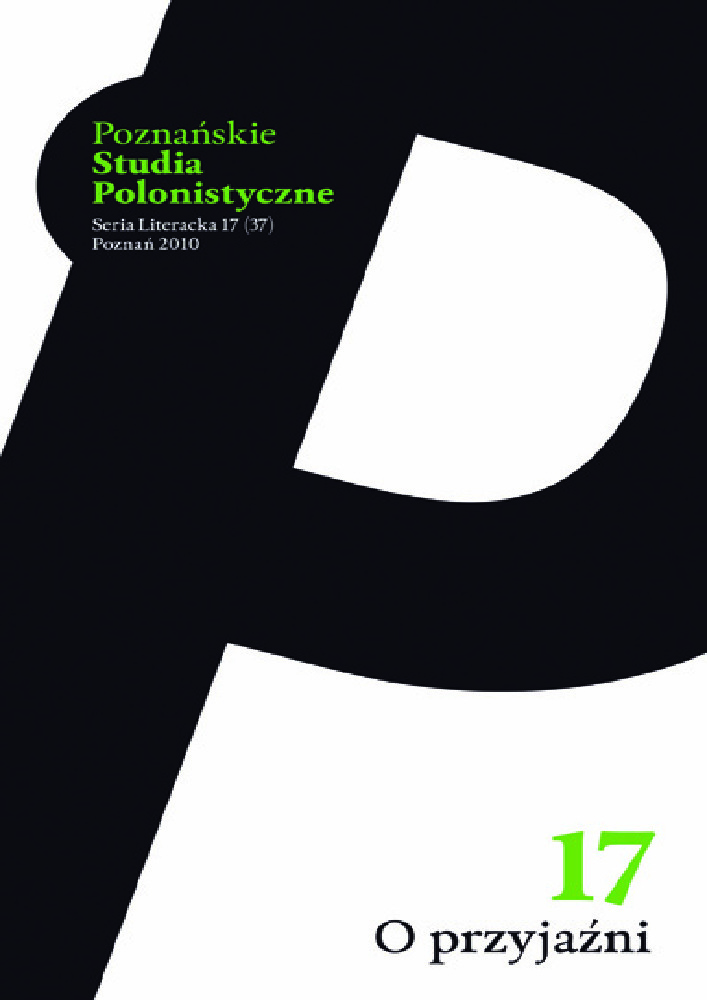Abstrakt
The present article analyses the rough drafts of Zbigniew Herbert’s essay on Hendrik Avercamp — the seventeenth century Dutch landscape painter who specialized in winter landscapes and scenes with numerous tiny figures. The author attempts to reconstruct the compositional idea for the essay and establishes facts concerning the research work done by Herbert concerning the life and work of Avercamp, confronts the findings with the present state of research and considers the issue of the biographical dimension of the painter’s artistic output as one of the keys to solving the interpretative problems of his paintings and the artistic tradition that had influenced the shaping of the Avercamp idiom of paintings. Avercamp’s works are juxtaposed in the article with the landscapes painted by Pieter Bruegel the Elder to show the difference between the visions of the world represented by the two painters. Bruegel, in Herbert’s opinion, is bitter in his reflection on the subject of transiency of human existence. Avercamp, conversely, tends to have a cheerful outlook on life, the world and his compatriots. Avercamp’s paintings allow us to get to know winter customs of the Dutch, their winter outdoor games participated by all — hence a thesis posed by the poet underlying the democratic character of skating rinks. In doing so, Herbert proposes to scrutinize carefully Avercamp’s artistic output within the context of, defined after Schiller, the notion of naivety, understood as “the virtue of accepting reality with humility” adopted from the old masters.Bibliografia
Archiwum Zbigniewa Herberta. Inwentarz, oprac. H. Citko, Warszawa 2008.
Bikker J., Hendrick Avercamp. „The Mute of Kampen”, w: Hendrick Avercamp. Master of Ice Scene, red. P. Roelofs et al., Amsterdam 2009.
Biusman J., Duizend jaar weer, wind en water in de Lage Landen, t. 1, Franeker 2000.
Hendrick Avercamp 1585–1634, Barent Avercamp 1612–1679. Frozen Silence. Paintings from museums and private collections, red. A. Blankert, Amsterdam–Zwolle 1982.
Herbert Z., De stomme van Kampen (1585–1634), „Zeszyty Literackie” 1999, nr 4, s. 11–14.
Od wydawcy, „Zeszyty Literackie” 1999, nr 4.
Herbert Z., De stomme van Kampen (1585–1634), w: „Mistrz z Delft” i inne utwory odnalezione, oprac., komentarz B. Toruńczyk, współpraca H. Citko, Warszawa 2008, s. 43–47.
Herbert Z., Martwa natura z wędzidłem, Warszawa 2003.
Herbert Z., Poezje, Warszawa 1998.
Holland Frozen in Time. The Dutch Winter Landscape in the Golden Age, red. A. van Suchtelen, współpraca F.J. Duparc, P. van der Ploeg, E. Runia, Zwolle 2006.
Hollanda F. da, Dialogi rzymskie [fragm.], przeł. L. Siemieński, w: Teoretycy, pisarze i artyści o sztuce 1500–1600, wybór, oprac. J. Białostocki, Warszawa 1985.
L’Entreprise Brueghel, red. P. van den Brink, Maastricht–Bruxelles 2001.
Mortier B.M. du, Aspects of Costume. A Showcase of Early 17th-Century Dress, w: Hendrick Avercamp. Master of Ice Scene, red. P. Roelofs et al., Amsterdam 2009, s. 141–163.
Pijbes W., Powell III E.A., Foreword, w: Hendrick Avercamp. Master of Ice Scene, red. P. Roelofs et al., Amsterdam 2009.
Roelofs P., The Paintings. The Dutch on the Ice, w: Hendrick Avercamp. Master of Ice Scene, red. P. Roelofs et al., Amsterdam 2009, s. 70–74.
Schiller F., O poezji naiwnej i sentymentalnej, przeł. I. Krońska, w: Dzieła wybrane, wybór, wstęp, oprac. S.H. Kaszyński, t. 1, Poznań 2006.
Slive S., Dutch Painting 1600–1800, New Haven–London 1995.
The Game of Colf, w: Holland Frozen in Time. Master of Ice Scene, red. P. Roelofs et al., Amsterdam 2009.
Thienen F. van, Das Kostüm der Blütezeit Hollands, Berlin 1930.
Toruńczyk B., Komentarze i objaśnienia, w: „Mistrz z Delft” i inne utwory odnalezione, oprac., komentarz B. Toruńczyk, współpraca H. Citko, Warszawa 2008.
Zumthor P., Życie codzienne w Holandii w czasach Rembrandta, przeł. E. Bąkowska, Warszawa 1965.
Licencja
Autorzy
Autorzy tekstów przyjętych do publikacji w czasopiśmie „Poznańskie Studia Polonistyczne. Seria Literacka” są zobowiązani do wypełnienia, podpisania i odesłania na adres redakcji umowy o udzielenie nieodpłatnej licencji do utworów, z zobowiązaniem do udzielania sublicencji CC.
Zgodnie z umową, autorzy tekstów opublikowanych w czasopiśmie „Poznańskie Studia Polonistyczne. Seria Literacka” udzielają Uniwersytetowi im. Adama Mickiewicza w Poznaniu niewyłącznej i nieodpłatnej licencji oraz zezwalają na użycie sublicencji Creative Commons Attribution-NoDerivatives 4.0 International (CC BY-ND 4.0).
Autorzy zachowują prawa do dalszego, swobodnego rozporządzania utworem.
Użytkownicy
Zainteresowani użytkownicy internetu uprawnieni są do korzystania z utworów opublikowanych od 2016 roku w „Poznańskich Studiach Polonistycznych. Serii Literackiej” pod następującymi warunkami:
- uznanie autorstwa – obowiązek podania wraz z rozpowszechnionym utworem, informacji, o autorstwie, tytule, źródle (odnośniki do oryginalnego utworu, DOI) oraz samej licencji;
- bez tworzenia utworów zależnych – utwór musi być zachowany w oryginalnej postaci, nie można bez zgody twórcy rozpowszechniać np. tłumaczeń, opracowań.
Do wszystkich tekstów opublikowanych przed 2016 r. prawa autorskie są zastrzeżone.
Inne
Uniwersytet im. Adama Mickiewicza w Poznaniu zachowuje prawo do czasopisma jako całości (układ, forma graficzna, tytuł, projekt okładki, logo itp.).
